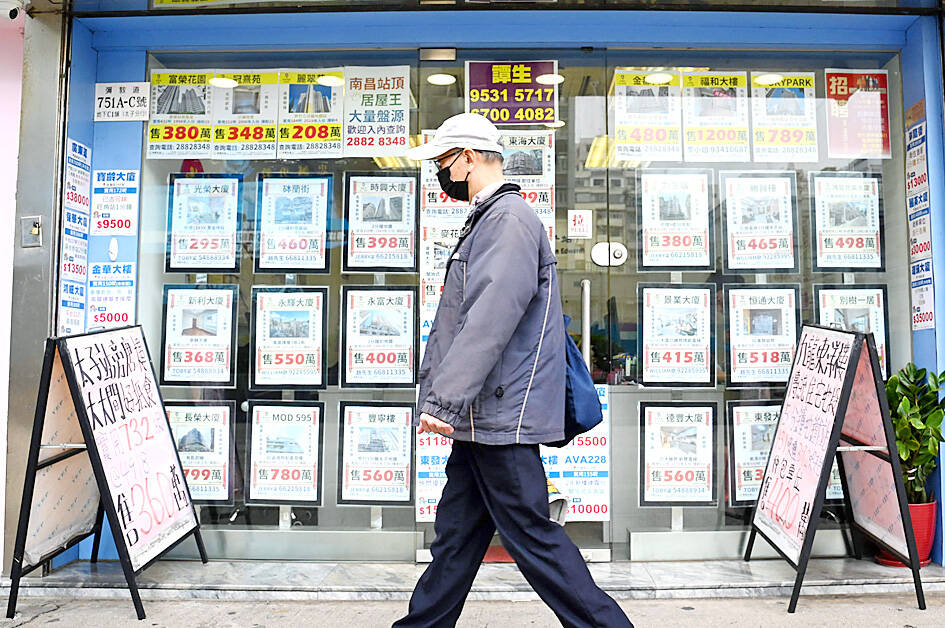Hong Kong has axed three major property transaction taxes in a bid to revive its depressed housing market, Hong Kong Financial Secretary Paul Chan (陳茂波) said in his annual budget speech yesterday.
The territory is among the world’s least-affordable residential markets, but home prices retreated last year amid high interest rates and an economic slowdown in China.
Hong Kong immediately scrapped three types of stamp duty, reversing measures introduced more than a decade ago to rein in speculation fueled in part by mainland Chinese buyers, Chan said.

Photo: AFP
“After prudent consideration of the overall current situation, we decide to cancel all demand-side management measures for residential properties with immediate effect,” Chan told the legislature.
The canceled taxes include stamp duties — which were once as high as 15 percent — imposed on property buyers who are not Hong Kong permanent residents and on those purchasing a second home.
“No Special Stamp Duty, Buyer’s Stamp Duty or New Residential Stamp Duty needs to be paid for any residential property transactions starting from today,” Chan said.
“We consider that the relevant measures are no longer necessary amidst the current economic and market conditions,” he said, adding that residential market sentiment became “very cautious” since the middle of last year.
Hong Kong had already reduced stamp duty in October last year in a bid to revive the market, but the reception had been largely muted.
Prices for apartments fell 7 percent last year and transactions slid 5 percent to about 43,000.
The weak housing market has also hurt public finances, with the Hong Kong government heavily reliant on land sales for revenue, but only netting HK$19.4 billion (US$2.5 billion) last year.
Hong Kong recorded a HK$102 billion deficit in 2023-2024, with fiscal reserves falling to HK$733 billion due to “challenges posed by the epidemic and external environment,” Chan said.
Hong Kong’s economy is expected to grow 2.5 percent to 3.5 percent this year, Chan said, aided by factors such as an expected interest rate cut by the US Federal Reserve.
“Amid a complicated and ever-changing international environment ... more strenuous efforts are required to strengthen momentum of our economic recovery,” Chan said.
He also pledged about HK$1 billion for tourism development, including funds for “mega events,” and monthly fireworks and drone shows over Victoria Harbour.
Hong Kong last year had about 34 million visitor arrivals, down from record levels of 65 million in 2018.
The Hong Kong Monetary Authority also relaxed mortgage rules, allowing homebuyers to borrow more, and eased an income-related stress test.

NEW IDENTITY: Known for its software, India has expanded into hardware, with its semiconductor industry growing from US$38bn in 2023 to US$45bn to US$50bn India on Saturday inaugurated its first semiconductor assembly and test facility, a milestone in the government’s push to reduce dependence on foreign chipmakers and stake a claim in a sector dominated by China. Indian Prime Minister Narendra Modi opened US firm Micron Technology Inc’s semiconductor assembly, test and packaging unit in his home state of Gujarat, hailing the “dawn of a new era” for India’s technology ambitions. “When young Indians look back in the future, they will see this decade as the turning point in our tech future,” Modi told the event, which was broadcast on his YouTube channel. The plant would convert

‘SEISMIC SHIFT’: The researcher forecast there would be about 1.1 billion mobile shipments this year, down from 1.26 billion the prior year and erasing years of gains The global smartphone market is expected to contract 12.9 percent this year due to the unprecedented memorychip shortage, marking “a crisis like no other,” researcher International Data Corp (IDC) said. The new forecast, a dramatic revision down from earlier estimates, gives the latest accounting of the ongoing memory crunch that is affecting every corner of the electronics industry. The demand for advanced memory to power artificial intelligence (AI) tasks has drained global supply until well into next year and jeopardizes the business model of many smartphone makers. IDC forecast about 1.1 billion mobile shipments this year, down from 1.26 billion the prior

People stand in a Pokemon store in Tokyo on Thursday. One of the world highest-grossing franchises is celebrated its 30th anniversary yesterday.

Zimbabwe’s ban on raw lithium exports is forcing Chinese miners to rethink their strategy, speeding up plans to process the metal locally instead of shipping it to China’s vast rechargeable battery industry. The country is Africa’s largest lithium producer and has one of the world’s largest reserves, according to the US Geological Survey (USGS). Zimbabwe already banned the export of lithium ore in 2022 and last year announced it would halt exports of lithium concentrates from January next year. However, on Wednesday it imposed the ban with immediate effect, leaving unclear what the lithium mining sector would do in the